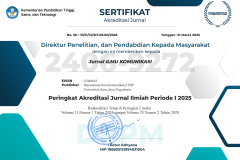Tuntutan Kemahiran Komunikasi Antarpribadi dalam Profesi: Perspektif Hongkong dan Indonesia
DOI:
https://doi.org/10.24002/jik.v3i1.242Abstract
Abstract: Hong Kong is widely acknowledged as one of the busiest financial and economic center in the world. Hundreds of world-class companies establish their representative offices in this former British colony. For the effectiveness of their operations, the companies, using newspaper advertisement, actively recruits intelligent and smart employees. Current research was designed to investigate how companies appreciate interpersonal communication skills when hiring new employees announced in the advertisements. Content of weekend edition of South China Morning Post, called “Classified Post†(about 100 pages), was scrutinized. To gain a little insight of the same phenomenon in Indonesia some editions of “Klasika†section of daily Kompas was analyzed. It was found that awareness of interpersonal communication skill, in general, was fairly high in the case of Hong Kong (38.2%), but only 9.83% for Indonesia. The top two professions in Hong Kong requiring this skill was public relations official (38.1%) and sale persons (32%). In the case of Indonesia, it was secretary and finance officials.
Downloads
Published
How to Cite
Issue
Section
License
Jurnal ILMU KOMUNIKASI is an academic journal. As such, it is dedicated to the open exchange of information. For this reason, JIK is freely available to individuals and institutions. Authors who publish in Jurnal ILMU KOMUNIKASI will release their articles under the Creative Commons Attribution (BY) License. This license allows anyone to copy and redistribute the article in any medium or format as well as remix, transform, and build upon the material for any purpose, even commercially as long as they credit the authors for the original creation. For details of the rights authors grants users of their work, see the "human-readable summary" of the license, with a link to the full license. (Note that "you" refers to a user, not an author, in the summary)
 This work is licensed under a Creative Commons Attribution 4.0 International License.
This work is licensed under a Creative Commons Attribution 4.0 International License.














